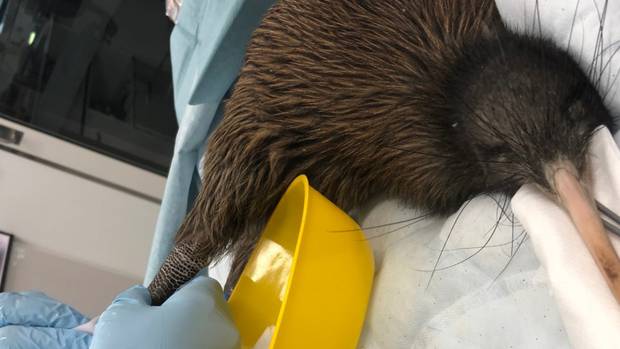A trapped little brown kiwi is lucky to be alive after it was rescued from a roadside culvert in Taranaki.
While it remains a mystery how the flightless bird became stuck in the culvert in early August, the native North Island Brown Kiwi owes his survival to two Downer roading inspectors who came across it during a routine inspection.
It will be several weeks before vets at Massey University's Wildbase Hospital, who are treating the injured kiwi, will know if it has a chance of long-term survival.
Logan Turner and colleague Isaak Ryan were inspecting culverts along State Highway 3 near Tongaporutu last month.
At first glance Ryan didn't see the bird, but the pair were surprised when a second look revealed the kiwi and its plight.
After contacting their supervisor, the men called the Department of Conservation hotline to alert them and offer information on the tools needed to remove the metal grate to reach the trapped bird.
A ranger was sent to the culvert to retrieve the stricken bird.
Clad in overalls and wearing elbow-length bird-handling gloves, Alison Evans clambered into the sump leading off the culvert and plucked the kiwi to safety.
"It didn't have any objection to being picked up and seemed almost relieved to be rescued. It was underweight, cold and suffering from exhaustion," said Evans.
"The culvert was a pretty inhospitable place to be imprisoned, with large trucks travelling past at open road speeds only a few metres away and water at the bottom of the sump."

The kiwi had been trying to escape to no avail with nails on each of his feet worn down to the bone.
"This kiwi is such a fighter! We are happy to report the little superstar is eating well in hospital and after the first week – when it was touch and go - he has started to venture around his room, exercise, forage and gain some much needed weight. But it's going to be a long journey," Wildbase Hospital supervisor Pauline Nijman said.
So far the kiwi has had several weeks of care, including several "pedicures" to clean the nail and bone, X-rays and blood samples.
The injured bird wasn't leg-banded or microchipped, suggesting it was a wild kiwi and not bred in captivity or released into the conservation area.
If he can be released back into the wild, DoC will liaise with iwi on arrangements.
It will be several weeks before Wildbase vets will know if the kiwi has a chance of long-term survival.
Evans said she was very grateful the staff from Downer took the initiative to call the department's hotline when they saw the kiwi was in trouble.
"We all have an obligation to watch out for injured native wildlife and this kiwi was very fortunate to be found alive.
"DoC, iwi and community groups have invested a lot of time into protecting areas known to support kiwi. This one who would have almost certainly died if it hadn't been found in the roadside sump."












